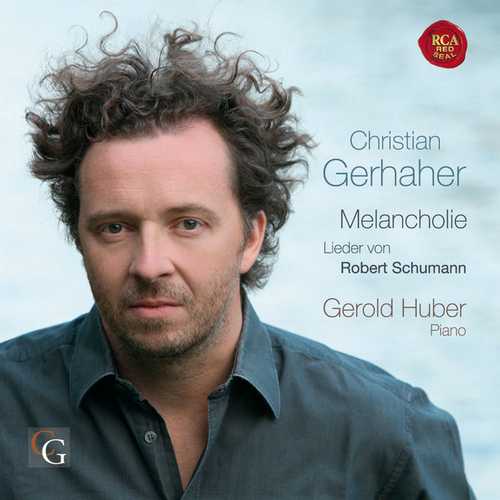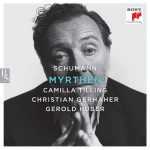
Composer: Robert Schumann
Performer: Christian Gerhaher, Gerold Huber
Format: FLAC (tracks)
Label: RCA
Catalogue: G010001263226J
Release: 2008
Size: 235 MB
Recovery: +3%
Scan: cover
01. Melancholie, Op. 74 / 6
Liederkreis nach Joseph von Eichendorff, Op. 39
02. 1. In der Fremde
03. 2. Intermezzo
04. 3. Waldesgespräch
05. 4. Die Stille
06. 5. Mondnacht
07. 6. Schöne Fremde
08. 7. Auf einer Burg
09. 8. In der Fremde
10. 9. Wehmuth
11. 10. Zwielicht
12. 11. Im Walde
13. 12. Frühlingsnacht
Lieder nach Hans Christian Andersen und Adelbert von Chamisso, Op. 40
14. No. 1, Märzveilchen
15. No. 2, Muttertraum
16. No. 3, Der Soldat
17. No. 4, Der Spielmann
18. No. 5, Verrathene Liebe
Sechs Gedichte aus dem Liederbuch eines Malers von Reinick, Op. 36
19. 1. Sonntags am Rhein
20. 2. Ständchen
21. 3. Nichts Schöneres
22. 4. An den Sonnenschein
23. 5. Dichters Genesung
24. 6. Liebesbotschaft
Gesänge des Harfners aus Op. 98a (Johann Wolfgang von Goethe)
25. Nr. 4: Wer nie sein Brot mit Tränen aß
26. Nr. 6: Wer sich der Einsamkeit ergibt
27. Nr. 8: An die Türen will ich schleichen
28. Tief im Herzen trag’ ich Pein, Op. 138 / 2
29. Der Einsiedler, Op. 83 / 3
Though the catch-all title ‘Melancholie’ is slightly misleading, Christian Gerhaher’s enterprisingly planned programme provides a conspectus of Schumann’s art as a Lieder composer.
With his bright, burnished high baritone, expressive diction and alert, unexaggerated response to mood and nuance, Gerhaher confirms his credentials as one of the most probing Lieder singers of the younger generation. While it is virtually impossible for a single voice to do equal justice to all 12 songs of the Liederkreis, he succeeds better than most. He beautifully suggests the melancholy and mystery of the opening ‘In der Fremde’, singing with fine legato and a subtly judged use of rubato, and brings an impetuous urgency and a chilling final frisson to the Lorelei scene ‘Waldesgespräch’. ‘Die Stille’, a difficult song for a man to bring off, is delicate and wondering without archness; the bardic ‘Auf einer Burg’ is hypnotically sustained in a numb, blanched tone, devoid of all nuances, while the final ‘Frühlingsnacht’, which can easily sound flustered, here has an ecstatic sense of finality.
Perhaps Gerhaher and the discerning if sometimes over-discreet Gerold Huber slightly miss the tremulous expectation of ‘Intermezzo’; and there have been more magical performances of ‘Mondnacht’, here taken dangerously slowly.
But for imaginative depth in the Liederkreis Gerhaher can certainly stand alongside the best.
Gerhaher and Huber choose unusually slow tempi for one or two of the other songs, most questionably in the Andersen song ‘Der Spielmann’, where the village wedding music should surely suggest more feverish wildness than here.
Far more often, though, Gerhaher impresses with his unselfconscious eloquence, whether in the anguished life-weariness of the Harpers’ songs, a chillingly timed and coloured ‘Der Soldat’ or in the potentially mawkish ‘Liebesbotschaft’, sung with a rapt, echt Schumannesque inwardness. Not for the only time in these Reinick songs, Gerhaher makes you ‘upgrade’ music that can look distinctly homely, even bland, on the printed page. The baritone provides his own thoughtful note, though frustratingly you’ll have to go to his website for English translations of the song texts.



